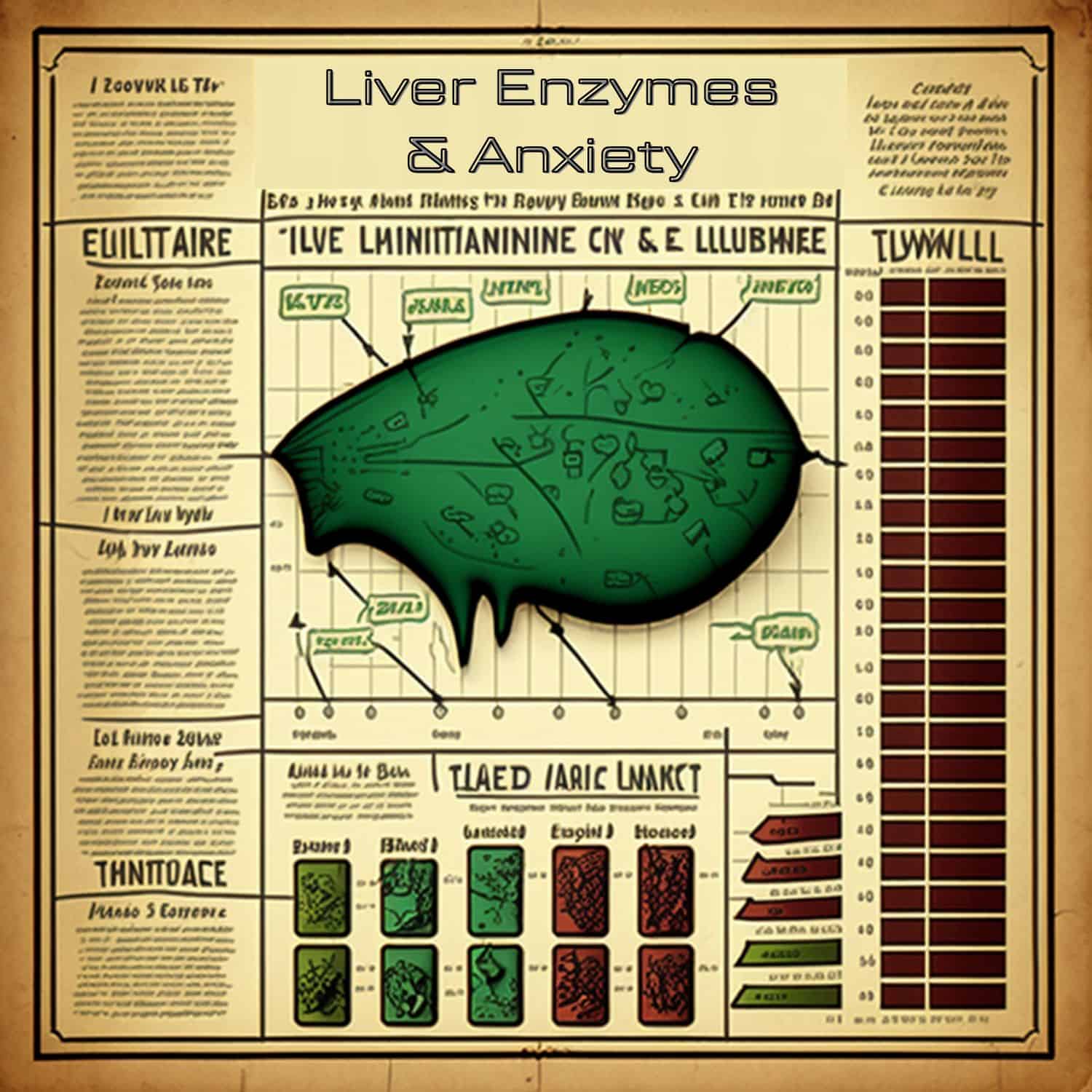Can Anxiety Cause Elevated Liver Enzymes

Table of Contents
Understanding the Link
Can Anxiety Cause Elevated Liver Enzymes? Elevated liver enzymes can have various causes, including liver conditions, viral hepatitis, metabolic syndrome, and psychological stress and anxiety.
Chronic stress and anxiety can increase oxidative stress and inflammation, impair liver regeneration, and lead to liver inflammation and damage.
To manage and reduce elevated liver enzymes related to stress and anxiety, individuals can practice stress-reduction techniques, seek treatment for anxiety disorders, make lifestyle changes such as regular exercise and a healthy diet, and monitor medication use.
Regular liver function tests are also important for early detection and prevention of complications.
The Liver
The liver is a vital organ that performs a multitude of essential functions in the body. It plays a crucial role in detoxifying the blood by removing harmful substances such as drugs and alcohol. The liver also produces bile, which is necessary for digesting fats, and helps regulate the levels of important hormones and nutrients in the body.
Liver enzymes are proteins produced by liver cells, and their levels in the blood can provide important information about liver function. Elevated levels of liver enzymes can be a sign of liver damage or dysfunction, which can be caused by a variety of factors such as alcohol consumption, viral hepatitis, nonalcoholic fatty liver disease, autoimmune hepatitis, and chronic liver disease.
The liver is an essential organ that performs many vital functions in the body, including detoxification, metabolism, and digestion. The liver also produces proteins, stores vitamins and minerals, and helps regulate blood sugar levels. Liver enzymes are proteins produced by liver cells, and elevated levels of liver enzymes in the blood can be a sign of liver damage or dysfunction.

Elevated Liver Enzymes Test
Liver enzymes are measured using a liver function test, which is a blood test that measures the levels of different liver enzymes in the blood. The most common liver enzymes measured in a liver function test are alanine aminotransferase (ALT), aspartate aminotransferase (AST), and alkaline phosphatase (ALP).
Elevated liver enzymes can have many different causes, including alcohol consumption, viral hepatitis (hepatitis B and C), nonalcoholic fatty liver disease (NAFLD), autoimmune hepatitis, and chronic liver disease. Elevated liver enzymes can also be caused by underlying medical conditions, such as cardiovascular disease, metabolic syndrome, and high blood pressure.
One of the most common causes of elevated liver enzymes is NAFLD, which is a condition where there is a buildup of fat in the liver cells. NAFLD is commonly associated with obesity, insulin resistance, and high levels of triglycerides in the blood. NAFLD can progress to non-alcoholic steatohepatitis (NASH), which is a more severe form of liver disease that can lead to liver inflammation and liver cell death.
Elevated liver enzymes can also be caused by psychological stress and anxiety disorder. Chronic stress and psychological distress have been shown to increase oxidative stress and inflammation, which can lead to liver inflammation and damage. Additionally, the liver is connected to the brain through the hepatic portal vein, which carries blood from the gastrointestinal tract to the liver. This connection means that the liver is affected by psychological stress and emotions, which can impact liver function.
High levels of liver enzymes can also be a side effect of certain medications, such as dietary supplements, and can occur due to chemical reactions in the body. Elevated liver enzymes can also be a sign of liver failure, which occurs when the liver is unable to perform its vital functions.
If you have elevated liver enzymes, your healthcare provider may recommend further testing to determine the underlying cause. This may include additional liver tests, such as a liver panel or a biopsy, and blood samples to measure serum albumin, red blood cells, and bile acids. Your healthcare provider may also check your kidney function and total cholesterol levels, as well as test for viral hepatitis.
Treatment for elevated liver enzymes will depend on the underlying condition. If the cause is alcohol intake, your healthcare provider may recommend lifestyle changes, such as reducing or eliminating alcohol consumption. If the cause is NAFLD or metabolic syndrome, weight loss and dietary changes may be recommended. If the cause is viral hepatitis, antiviral medications may be prescribed. In some cases, a liver transplant may be necessary.
To reduce the risk of elevated liver enzymes and liver problems, it is important to maintain a healthy lifestyle, including regular exercise, a balanced diet, and limiting alcohol intake. Managing stress through relaxation techniques, such as meditation and yoga, can also help reduce the risk of liver damage from psychological stress.
In conclusion, elevated liver enzymes can be caused by many different factors, including liver conditions, viral hepatitis.

The Role of Stress in Elevating Liver Enzymes
Stress and anxiety have been shown to contribute to high liver enzymes.
One way this occurs is through the activation of the hypothalamic-pituitary-adrenal (HPA) axis, which is the body’s primary stress response system. When activated, the HPA axis stimulates the release of cortisol and other stress hormones into the bloodstream, which can lead to liver damage and elevated liver enzyme levels.
Stress can impact liver function through various mechanisms. One of these mechanisms is the activation of the hypothalamic-pituitary-adrenal (HPA) axis, which stimulates the release of cortisol and other stress hormones.
Cortisol can affect liver metabolism by increasing the breakdown of glucose and glycogen, leading to elevated blood sugar levels. Stress can also impact gut microbiota, which play a crucial role in liver function and health.
Chronic stress can disrupt the gut microbiota and increase intestinal permeability, leading to inflammation and liver damage. Additionally, stress can decrease the number and activity of natural killer cells, which play a role in liver health and function. These mechanisms underscore the importance of stress management in maintaining liver health.
Stress can also lead to vasoconstriction, or the narrowing of blood vessels, which reduces blood flow to the liver and impacts liver function.
Chronic stress and anxiety can decrease the number and activity of natural killer cells, which are part of the immune system and play a role in liver health and function. This decrease in natural killer cells can lead to liver damage and high liver enzyme levels.
Stress-induced liver injury can also lead to increased susceptibility to liver cancer, as evidenced by animal studies.
Chronic stress can impair the liver’s ability to regenerate and recover from damage, which can further exacerbate liver damage and contribute to abnormal liver enzyme levels.
Stress-induced changes in gut microbiota can also contribute to liver injury, as gut microbiota play a crucial role in liver function and health.
Certain medications used to treat anxiety disorders, such as benzodiazepines and antidepressants, can affect liver function and contribute to high liver enzyme levels.
Stress can exacerbate liver damage and lead to further complications in individuals who already have liver disease or liver damage.

Health Recommendations
Practice stress reduction techniques: Relaxation techniques such as meditation, yoga, deep breathing, and mindfulness-based interventions like MBSR and MBCT may be effective in reducing stress and improving liver function in individuals with liver disease.
Seek treatment for anxiety disorders: Addressing underlying anxiety or depression through therapy or medication may be beneficial for liver health.
Lifestyle changes: Regular exercise, a healthy diet, and reducing alcohol intake can help reduce the risk of liver damage from stress.
Regular liver function tests: Regular liver function tests, especially for individuals with risk factors for liver disease, can help detect liver damage early and prevent complications.
Avoid natural remedies and dietary supplements without guidance: Certain natural remedies or dietary supplements can interact with medications or cause liver damage in high doses, so it’s important to only use them under the guidance of a healthcare professional.
Identify and manage stressors: Cognitive-behavioral therapy (CBT) can help individuals identify and manage stressors, which may also be helpful in addressing underlying anxiety or depression.
Monitor medication use: Certain medications used to treat anxiety disorders, such as benzodiazepines and antidepressants, can affect liver function and contribute to high liver enzyme levels. It’s important to work with a healthcare professional to monitor medication use and liver function.
Reference
American Liver Foundation – https://liverfoundation.org/
National Institute of Diabetes and Digestive and Kidney Diseases (NIDDK) – https://www.niddk.nih.gov/health-information/liver-disease
Mayo Clinic – https://www.mayoclinic.org/diseases-conditions/liver-problems/symptoms-causes/syc-20374502
Centers for Disease Control and Prevention (CDC) – https://www.cdc.gov/liverdisease/
World Health Organization (WHO) – https://www.who.int/news-room/fact-sheets/detail/hepatitis-b
These websites provide reliable and evidence-based information on stress and liver issues, and are great resources for individuals looking to learn more about these topics.







